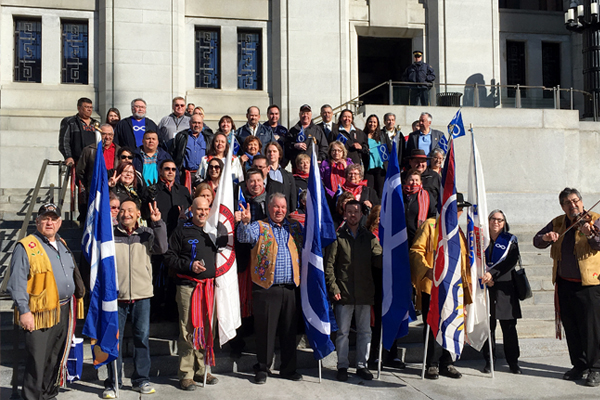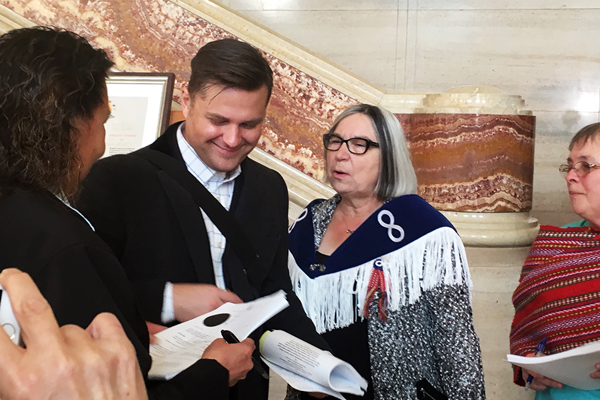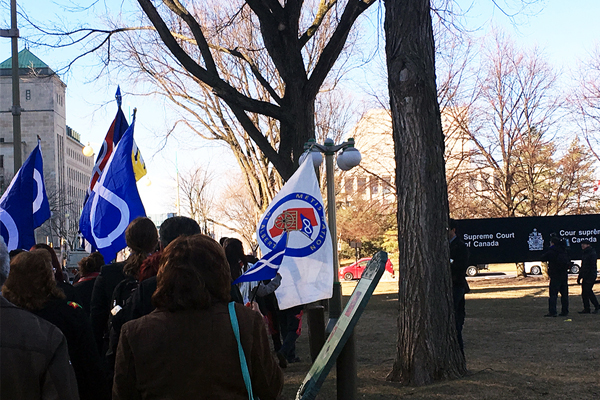Daniels Case Decision a Massive Victory for Métis Rights
Posted on: Apr 14, 2016

Edmonton, AB – Thursday, April 14, 2016
Today is a historic day for the Métis Nation. This morning, the Supreme Court of Canada ruled in favour of the Daniels case.
The Daniels case victory is significant and will facilitate reconciliation between Parliament and Métis communities from Ontario westward. For many years, Métis communities were left in a “jurisdictional wasteland”, however, this morning’s ruling will “guarantee both certainty and accountability” and allow the Métis Nation to hold government “accountable for the inadequate status quo.” This monumental decision will help to foster a true nation-to-nation relationship between the Métis Nation and the Government of Canada and to advance reconciliation in the years to come.
MNA President Audrey Poitras and delegates from the MNA including regional and local presidents and vice-presidents were in attendance at the Supreme Court as the decision was rolled out. President Poitras remarked that “this is the long awaited Métis victory we anticipated which is a significant advancement of the Métis rights agenda. I am confident that good things will follow for the Métis Nation.”
MNA Legal Counsel and Métis Lawyer Jason Madden from Pape Salter Teillet LLP has provided invaluable assistance throughout the Daniels litigation process and commented “we have worked long and hard to see this case through to fruition. Legally speaking, the Daniels triumph acknowledges the Crown’s duty to consult with Métis communities and will strengthen our position as a Nation in future government negotiations.”


The full decision of the Supreme Court of Canada in the Daniels case can be found at: http://scc-csc.lexum.com/scc-csc/scc-csc/en/15858/1/document.do
Key elements of the Supreme Court of Canada judgement are outlined below:
Declaration #1
- A declaration that Métis and Non-Status Indians are within the term “Indians” in Section 91(24) is issued. (para. 58)
- The declaration has practical utility to end the “jurisdictional tug-of-war” (para. 15). The Court acknowledged that the current situation has left Métis and non-status Indian communities in a “jurisdictional wasteland” so an answer to the question is necessary (para. 13). An answer to the question will allow these groups to hold government “accountable for the inadequate status quo” and “guarantee both certainty and accountability” (para. 15)
- Section 91(24) is about the federal governments relationship with all of Canada’s Aboriginal peoples—this includes the Métis and Non-Status Indians (para. 49). Section 91(24) and s. 35 should be read together in order to advance reconciliation.
- Constitutional changes, apologies for historic wrongs and appreciation of Aboriginal peoples as partners in Confederation all indicate that reconciliation with all of Canada’s Aboriginal peoples is Parliaments goal (para 37).
- There is no doubt that the Métis are a distinct people (para. 42). No need to delineate between which mixed ancestry communities are Métis and which are non status—they are both “Indians” within s. 91(24) (para. 46) Whether a community is non-status Indian and Métis will be worked out on a case-by-case basis. (para. 47)
- Section 91(24) has a different purpose that s. 35. Section 91(24) is about the federal governments relationship with Canada’s aboriginal peoples. Section 35 deals with the recognition and affirmation or rights and claims. (para. 49).
- The Court goes out of its way to note that Métis and Non-Status Indian inclusion in s. 91(24) does not mean that all provincial legislation with respect to these groups are ultra vires (i.e., outside of the authority of provincial legislatures). This means that the Alberta Métis Settlements legislation is not problematic or inconsistent with Métis inclusion in s. 91(24).
Declaration #2
- The Crown is in a fiduciary relationship with all Aboriginal peoples, including, the Métis and Non-Status Indians. Delgamuukw and MMF already recognize that this fiduciary relationship based on Indigenous pre-existence. As such, granting the third declaration would be redundant. (paras. 43, 53)
Declaration #3
- There is already a Crown duty to negotiate with Métis and Non-Status Indian communities recognized in law. Haida, Tsilquotin and Powley already recognize a context specific duty to negotiate when Aboriginal rights are engaged. As such, granting the third declaration would be redundant. (para 56)